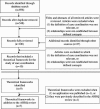An in-depth analysis of theoretical frameworks for the study of care coordination
- PMID: 23882171
- PMCID: PMC3718267
- DOI: 10.5334/ijic.1068
An in-depth analysis of theoretical frameworks for the study of care coordination
Abstract
Introduction: Complex chronic conditions often require long-term care from various healthcare professionals. Thus, maintaining quality care requires care coordination. Concepts for the study of care coordination require clarification to develop, study and evaluate coordination strategies. In 2007, the Agency for Healthcare Research and Quality defined care coordination and proposed five theoretical frameworks for exploring care coordination. This study aimed to update current theoretical frameworks and clarify key concepts related to care coordination.
Methods: We performed a literature review to update existing theoretical frameworks. An in-depth analysis of these theoretical frameworks was conducted to formulate key concepts related to care coordination.
Results: Our literature review found seven previously unidentified theoretical frameworks for studying care coordination. The in-depth analysis identified fourteen key concepts that the theoretical frameworks addressed. These were 'external factors', 'structure', 'tasks characteristics', 'cultural factors', 'knowledge and technology', 'need for coordination', 'administrative operational processes', 'exchange of information', 'goals', 'roles', 'quality of relationship', 'patient outcome', 'team outcome', and '(inter)organizational outcome'.
Conclusion: These 14 interrelated key concepts provide a base to develop or choose a framework for studying care coordination. The relational coordination theory and the multi-level framework are interesting as these are the most comprehensive.
Keywords: care coordination; coordination strategies; organizational models (Mesh); review (Mesh); theoretical models (Mesh).
Figures
References
-
- Institute of Medicine. Crossing the quality chasm: a new health system for the 21st century. Washington, DC: National Academy Press; 2011.
-
- Wagner EH, Austin BT, Davis C, Hindmarsh M, Schaefer J, Bonomi A. Improving chronic illness care: translating evidence into action. Health Affairs (Millwood) 2001;20(6):64–78. - PubMed
-
- Bodenheimer T. Coordinating care—a perilous journey through the health care system. The New England Journal of Medicine. 2008;358(10):1064–71. - PubMed
-
- Kodner DL, Spreeuwenberg C. Integrated care: meaning, logic, applications and implications—a discussion paper. International Journal of Integrated Care [serial online] 2002;14(2):1–6. Available from: http://www.ijic.org. URN:NBN:NL:UI:10-1-100309. - PMC - PubMed
-
- McDonald KM, Sundaram V, Bravata DM, Lewis R, Lin N, Kraft S, et al. Care coordination. Rockville, MD: Agency for Healthcare Research and Quality; 2007. Report No.: 7. - PubMed
LinkOut - more resources
Full Text Sources



